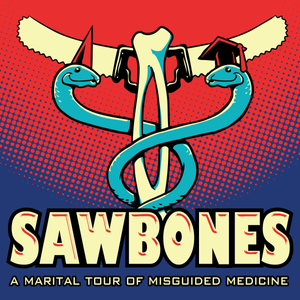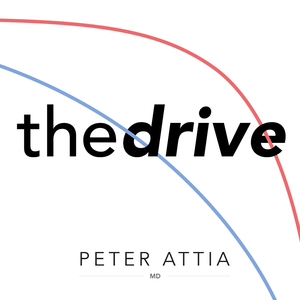
26 - The God Squad
08/31/17 • 38 min
The invention of dialysis -- essentially artificial kidneys for people with kidney failure -- revolutionized medicine. It also started a debate about medical rationing and ethics that rages to this day. Producer Cam Steele brings us a story about the God Squad, the group of lay people and doctors tasked with deciding who lived and who died in the early days of dialysis, and how it has informed every debate about medical rationing since. Learn about all this and more, plus a new #AdamAnswers in the latest episode of Bedside Rounds, a tiny podcast about fascinating stories in clinical medicine.
Sources:
- Blagg CR, Development of ethical concepts in dialysis: Seattle in the 1960s. Nephrology, 1998.4, 235-238
- Scheunemann L and White D, The Ethics and Reality of Rationing in Medicine, Chest, 140; 6. December 2011
- White DB et al, Who should receive life support during a public health emergency? Using ethical principles to improve allocation decisions. Ann Intern Med. 2009 January 20; 150(2): 132–138.
- Jonson AR, The God Squad and the Origins of Transplantation Ethics and Policy, Journal of Law, Medicine, and Ethics.
- Levine C, The Seattle “God Committee”: A Cautionary Tale; Nov 30 2009.
- Blagg, CR. The Early Years of Chronic Dialysis: The Seattle Contribution. Am J Nephrol 1999;19:350–354
- Persad, et al. Principles for allocation of scarce medical interventions, Lancet 2009; 373: 423–31.
- Bryson, et al. Addiction and Substance Abuse in Anesthesiology. Anesthesiology. 2008 Nov; 109(5): 905–917.
- Hughes, et al. Resident Physician Substance Use, By Specialty. Am J Psychiatry 1992; 149: 1348-1354.
The invention of dialysis -- essentially artificial kidneys for people with kidney failure -- revolutionized medicine. It also started a debate about medical rationing and ethics that rages to this day. Producer Cam Steele brings us a story about the God Squad, the group of lay people and doctors tasked with deciding who lived and who died in the early days of dialysis, and how it has informed every debate about medical rationing since. Learn about all this and more, plus a new #AdamAnswers in the latest episode of Bedside Rounds, a tiny podcast about fascinating stories in clinical medicine.
Sources:
- Blagg CR, Development of ethical concepts in dialysis: Seattle in the 1960s. Nephrology, 1998.4, 235-238
- Scheunemann L and White D, The Ethics and Reality of Rationing in Medicine, Chest, 140; 6. December 2011
- White DB et al, Who should receive life support during a public health emergency? Using ethical principles to improve allocation decisions. Ann Intern Med. 2009 January 20; 150(2): 132–138.
- Jonson AR, The God Squad and the Origins of Transplantation Ethics and Policy, Journal of Law, Medicine, and Ethics.
- Levine C, The Seattle “God Committee”: A Cautionary Tale; Nov 30 2009.
- Blagg, CR. The Early Years of Chronic Dialysis: The Seattle Contribution. Am J Nephrol 1999;19:350–354
- Persad, et al. Principles for allocation of scarce medical interventions, Lancet 2009; 373: 423–31.
- Bryson, et al. Addiction and Substance Abuse in Anesthesiology. Anesthesiology. 2008 Nov; 109(5): 905–917.
- Hughes, et al. Resident Physician Substance Use, By Specialty. Am J Psychiatry 1992; 149: 1348-1354.
Previous Episode

Summer Shorts #1 - The Eclipse
The eclipse is coming! Get out your eclipse glasses (or your camera obscura, if you didn't prepare like me), and enjoy a review of the medical literature on eclipses with our guest Dr. Avi O'Glasser in our first summer short. Beyond solar retinopathy (a very good reason to not look into the sun), are there health effects on humans? Is there anything to the widespread belief of an eclipse being a bad omen? Find out all this and more in our first Bedside Rounds Summer Short. And thanks so much to Dr. O'Glasser!
References:
- http://www.asrs.org/patients/retinal-diseases/special-safety-edition-2017-great-american-eclipse
- A New Way to Look Up. Solar Retinopathy Risks and Methods of Prevention Prior to the 2015 Solar Eclipse
- Public health warnings of solar retinopathy risk in European newspapers prior to the 2006 solar eclipse. (http://www.oftalmo.com/seo/archivos/maquetas/C/1C6CE602-7C96-3DE8-336A-00001A483D3C/articulo.pdf)
- EFFECT OF ECLIPSE OF THE SUN IN 1999 ON THE PSYCHIC STATE OF PEOPLE http://www.prolekare.cz/en/general-practitioner-article/effect-of-eclipse-of-the-sun-in-1999-on-the-psychic-state-of-people-25088
Next Episode

Summer Shorts #2 - Corrupted Blood
In 2005, a mysterious plague called Corrupted Blood hit the online denizens of World of Warcraft, ripping through cities and decimating player characters. After the smoke cleared, it became clear that this virtual plague shared many characteristics with real-world diseases and almost immediately attracted the attention of researchers. In this Summer Short, I go over the details of the in-game Corrupted Blood incident, and the very real-world epidemiological research that followed. Learn about all this and more on the latest short of Bedside Rounds, a tiny podcast about fascinating stories in clinical medicine.
Sources:
- Bohannon J. Slaying monsters for science. Science 20 Jun 2008.
- Messner S. How Blizzard coped with World of Warcraft's blood plague and other early disasters. PC Gamer.
- Henderson M. Analysis: Absence of risk limits parallels with real life. Times Online. October 28, 2008
- Oultram S. Virtual plagues and real-world pandemics: reflecting on the potential for online computer role-playing games to inform real world epidemic research. BMJ.
- Lofgren E, Fefferman N. The untapped potential of virtual game worlds to shed light on real world epidemics. Lancet Infect Dis 2007;9:625–9.
If you like this episode you’ll love
Episode Comments
Featured in these lists
Generate a badge
Get a badge for your website that links back to this episode
<a href="https://goodpods.com/podcasts/bedside-rounds-189795/26-the-god-squad-17531175"> <img src="https://storage.googleapis.com/goodpods-images-bucket/badges/generic-badge-1.svg" alt="listen to 26 - the god squad on goodpods" style="width: 225px" /> </a>
Copy





